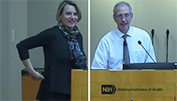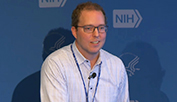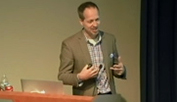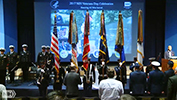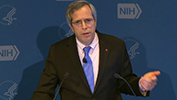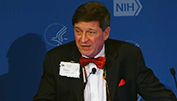-
- NIH VideoCast - Genome maintenance by a macro-histone: shaping up the epigenome
-
- - Philipp Oberdoerffer, Ph.D., Investigator, Laboratory of Receptor Biology and Gene Expression, Head, Epigenetics of DNA Repair and Aging Section, CCR, NCI, NIH (2017/11/28)
- - Category : DNA Repair
- DNA repair videoconference
NIH VideoCast - Genome maintenance by a macro-histone: shaping up the epigenome
-
- NIH VideoCast - Cross-modal plasticity of cortical circuits
-
- - Hey-Kyoung Lee, Ph.D., Mind/Brain Institute, Johns Hopkins University (2017/11/28)
- - Category : Neuroscience
- NIH Neuroscience Series Seminar
Our daily experience can trigger lasting memories, which are stored in our brains. Memories are stored ultimately by changing the way neurons convey information. More precisely, they are stored as changes in the function of synapses: the structures by which neurons contact and transmit signals to each other. Dr. Lee???s laboratory is interested in exploring the cellular and molecular changes that happen at the synapses to allow memory storage.
Combining various techniques, such as electrophysiological recording, biochemical/molecular analysis, and imaging, they are aiming to understand the cellular and molecular changes that happen during synaptic plasticity. It is well established that neural activity can trigger synaptic changes, such as long-term potentiation (LTP) and long-term depression (LTD), which are cellular models of learning and memory. However, in addition to LTP and LTD, more global mode of plasticity needs to be in place to provide stability to neural networks. Currently, they are examining molecular and cellular mechanisms of global homeostatic synaptic plasticity using sensory cortices as model systems. They found that loss of vision elicits global changes in excitatory synaptic transmission in primary visual cortex, which is primarily due to regulation of postsynaptic AMPA type glutamate receptors. Interestingly, vision loss triggers opposite changes in other primary sensory cortices, which we postulate underlies sensory compensation in blind. Elucidating the mechanisms underlying such cross-modal synaptic plasticity is one of the main research foci of the lab.
In addition to understanding the basic mechanisms of how experience alters the brain, Dr. Lee???s lab is also interested in elucidating the events that occur in diseased brains. Alzheimer`s disease is a devastating memory disorder that affects the social well-being of affected individuals. In collaboration with Dr. Philip Wong at Johns Hopkins School of Medicine, they are analyzing various mouse models of Alzheimer`s disease, especially focusing on the possible alterations in synaptic plasticity mechanisms.
For more information go to https://neuroscience.nih.gov/neuroseries/Home.aspx
NIH VideoCast - Cross-modal plasticity of cortical circuits
-
- NIH VideoCast - TRACO 2017: Functional genomics and HIV
-
- - Natasha J. Caplen, Ph.D., NCI, NIH and Frank Maldarelli, M.D., Ph.D., CCR, NCI, NIH (2017/11/22)
- - Category : TRACO
- Translational Research in Clinical Oncology (TRACO)
Recent advances in understanding cancer biology are beginning to be translated into improvements in diagnosis and treatment of cancer. In the post-genome era, we increasingly rely on strong collaboration between basic and clinical scientists to develop novel approaches for treatment of human disease. The NCI Center for Cancer Research (CCR) is one of the largest cancer research organizations in the world, with more than 200 principal investigators, and has played a major role in developing and implementing many new technologies, such as nanotechnology, next generation sequencing, genomics and proteomics.
For more information go to http://ccr.cancer.gov/training/trainee-resources/courses-workshops/traco
NIH VideoCast - TRACO 2017: Functional genomics and HIV
-
- NIH VideoCast - Office of AIDS Research Advisory Council Meeting - November 2017
-
- - NIAID, NIH (2017/11/21)
- - Category : AIDS Research Advisory Committee
- OAR Director???s Report, updates for the DHHS HIV Treatment and Prevention Guidelines, OAR Task Force on Cost Sharing, plans for the Clinical Trials Networks from the National Institute of Allergy and Infectious Diseases, and updates on the HIV/AIDS research activities from Institutes at the NIH.
NIH VideoCast - Office of AIDS Research Advisory Council Meeting - November 2017
-
- NIH VideoCast - Stem Cell Aging
-
- - Dr. Sean Morrison (2017/11/21)
- - Category : Geroscience
- GeroScience Interest Group
The Trans-NIH GeroScience Interest Group (GSIG), cordially invites you to its fall seminar, featuring Dr. Sean Morrison. Dr. Morrison is the Director of the Children???s Medical Center Research Institute at UT Southwestern and is the Mary McDermott Cook Chair in Pediatric Genetics as well as an Investigator of the Howard Hughes Medical Institute. The Morrison laboratory studies the cellular and molecular mechanisms that regulate the function of stem cells and cancer cells in the nervous and hematopoietic systems. The laboratory is particularly interested in the mechanisms that regulate stem cell self-renewal and stem cell aging, as well as the role these mechanisms play in cancer. Dr. Morrison was a Searle Scholar (2000-2003), was named to Technology Review Magazine`s list of 100 young innovators (2002), received the Presidential Early Career Award for Scientists and Engineers (2003), the International Society for Hematology and Stem Cell`s McCulloch and Till Award (2007) the American Association of Anatomists Harland Mossman Award (2008), and a MERIT Award from the National Institute on Aging. Dr. Morrison has also been active in public policy issues surrounding stem cells. He has twice testified before Congress and was a leader in the successful "Proposal 2" campaign to protect stem cell research in Michigan`s state constitution.
The GSIG was created to discuss and explore the complex relationships between the biology of aging and the biology of diseases and conditions that are of interest to various institutes and centers across the NIH. If you are interested in learning more, please visit the GSIG web site (http://sigs.nih.gov/geroscience/Pages/default.aspx).
NIH VideoCast - Stem Cell Aging
-
- NIH VideoCast - Cells as Anti-Cancer Drugs: Entering Mainstream Oncology
-
- - Steven A. Rosenberg, M.D., Ph.D., Branch Chief, Senior Investigator, Surgery Branch, National Cancer Institute, NIH (2017/11/21)
- - Category : Philip S. Chen - Innovation & Technology Transfer
- 12th annual Philip S. Chen, Jr., Ph.D. Distinguished Lecture on Innovation and Technology Transfer
The Office of Intramural Research, Office of the Director, NIH, invites you to the 12th annual Philip S. Chen, Jr., Ph.D. Distinguished Lecture on Innovation and Technology Transfer. Dr. Steven A. Rosenberg will present ???Cells as Anti-Cancer Drugs: Entering Mainstream Oncology.??? Dr. Rosenberg is Branch Chief and Senior Investigator at the Surgery Branch, National Cancer Institute.
For more information go to https://www.ott.nih.gov/twelfth-annual-philip-s-chen-jr-phd-distinguished-lecture-innovation-and-technology-transfer
NIH VideoCast - Cells as Anti-Cancer Drugs: Entering Mainstream Oncology
-
- NIH VideoCast - Sayer Vision Research Lecture: Microglia in the Retina: Roles in Health, Aging, and Disease
-
- - Wai T. Wong, M.D., Ph.D., Chief, Unit on Neuron-Glia Interactions in Retinal Disease, NEI, NIH (2017/11/21)
- - Category : Special
- 10th Sayer Vision Research Lecture
Dr. Wai T. Wong, Chief of NEI`s Unit on Neuron-Glia Interactions in Retinal Disease, will describe efforts to understand how chronic neuroinflammation contributes to diseases of the retina, the light-sensitive tissue at the back of the eye.
NIH VideoCast - Sayer Vision Research Lecture: Microglia in the Retina: Roles in Health, Aging, and Disease
-
- NIH VideoCast - Optogenetic analysis of neural circuits and behavior in zebrafish
-
- - Herwig Baier, PH.D., Max Planck Institute of Neurobiology (2017/11/21)
- - Category : Neuroscience
- NIH Neuroscience Series Seminar
Robert Whitney Newcomb Lecture
All sensory perception and every coordinated movement, as well as feelings, memories and motivation, arise from the bustling activity of many millions of interconnected cells in the CNS. The ultimate function of this elaborate network is to generate behavior. The goal of Dr. Baier lab???s research is to understand how animal brains integrate the information about sensory inputs and internal state into behavioral responses. They use zebrafish as their experimental model, employing a diverse array of methods. Their approaches take advantage of the feature that zebrafish larvae are optically transparent and genetically accessible. The goal of their research is to understand how neuronal circuits convert sensory inputs into behavioral responses.
For more information go to https://neuroscience.nih.gov/neuroseries/Home.aspx
NIH VideoCast - Optogenetic analysis of neural circuits and behavior in zebrafish
-
- NIH VideoCast - TRACO 2017: Non-SCLC and HSP90 chaperone
-
- - Eva Szabo, MD, NCI, NIH and Leonard M. Neckers, Ph.D, NCI, NIH (2017/11/19)
- - Category : TRACO
- Translational Research in Clinical Oncology (TRACO)
Recent advances in understanding cancer biology are beginning to be translated into improvements in diagnosis and treatment of cancer. In the post-genome era, we increasingly rely on strong collaboration between basic and clinical scientists to develop novel approaches for treatment of human disease. The NCI Center for Cancer Research (CCR) is one of the largest cancer research organizations in the world, with more than 200 principal investigators, and has played a major role in developing and implementing many new technologies, such as nanotechnology, next generation sequencing, genomics and proteomics.
For more information go to http://ccr.cancer.gov/training/trainee-resources/courses-workshops/traco
NIH VideoCast - TRACO 2017: Non-SCLC and HSP90 chaperone
-
- NIH VideoCast - CC Grand Rounds: (1) Intestinal Lymphangiectasia (Waldmann???s Disease): Remembrances of Things Past and (2) Waldmann`s Disease: New Molecular Pathogenesis, Diagnostics, and Treatment Through Genomics
-
- - Thomas Waldmann, MD, NIH Distinguished Investigator and Chief, Lymphoid Malignancies Branch, NCI, NIH and Michael Lenardo, MD, Chief, Molecular Development of the Immune System and Director, Clinical Genomics Program, NIAID, NIH (2017/11/19)
- - Category : Clinical Center Grand Rounds
- CC Grand Rounds: (1) Intestinal Lymphangiectasia (Waldmann???s Disease): Remembrances of Things Past and (2) Waldmann`s Disease: New Molecular Pathogenesis, Diagnostics, and Treatment Through Genomics
For more information go to http://www.cc.nih.gov/about/news/grcurrent.html
NIH VideoCast - CC Grand Rounds: (1) Intestinal Lymphangiectasia (Waldmann???s Disease): Remembrances of Things Past and (2) Waldmann`s Disease: New Molecular Pathogenesis, Diagnostics, and Treatment Through Genomics
-
- NIH VideoCast - Unraveling the complexities of tryptase form and function in humans
-
- - Jonathan Lyons, MD, Assistant Clinical Investigator, Genetics and Pathogenesis of Allergy Section, NIAID, NIH (2017/11/19)
- - Category : Immunology
- Immunonology IG Seminar
Dr. Jonathan Lyons received his undergraduate education from Pomona College, and a Doctorate of Medicine from the University of Southern California in 2007. Dr. Lyons completed residency training in Internal Medicine at the University of California, San Diego, in 2010, remaining an additional year as a Chief Medical Resident. He concluded his formal medical training as a clinical fellow in Allergy and Immunology at NIAID in 2014. Following completion of fellowship, Jonathan was selected for the NIAID Transition Program in Clinical Research, and he is currently an Assistant Clinical Investigator in the Laboratory of Allergic Diseases. He has been a member of the Genetics and Pathogenesis of Allergy Section since 2012. During that time, he has contributed to the identification of a number of novel monogenic causes of allergic inflammation and immune dysregulation. His current areas of research build upon two of the major findings of his previous work: 1) characterizing mechanisms by which metabolic derangement can promote allergic disease; and 2) studying individuals with hereditary alpha tryptasemia in order to elucidate pathways that promote myeloid proliferation and mast cell reactivity, which can ultimately be targeted to limit anaphylaxis and treat myeloproliferative disease
NIH VideoCast - Unraveling the complexities of tryptase form and function in humans
-
- NIH VideoCast - Meet the Research Mentors
-
- - OD/EDI/WEC, COSWD, OIR (2017/11/19)
- - Category : Special
- This event is sponsored by the Office of Equity Diversity and Inclusion (EDI) Women???s Engagement Committee (WEC), Chief Office of Scientific Workforce Diversity (COSWD)and the Office of Intramural Research (OIR). A panel of 4 NIH senior scientist will provide mentorship and advice for tenure track and Assistant Clinical Investigators (ACI) for what we will pilot with plans to turn into a quarterly series on a variety of relevant topics for this particular workforce population. This first installment will discuss best practices in transitioning from fellow to principle investigator, while juggling work and family life, and a host of other interesting topics.
NIH VideoCast - Meet the Research Mentors
-
- NIH VideoCast - David Derse Lecture: Virus-Host Interactions in Human Disease
-
- - Reuben S. Harris, Ph.D., Howard Hughes Medical Institute, University of Minnesota (2017/11/16)
- - Category : Special
- Sixth Annual David Derse Memorial Lecture and Award
The HIV Dynamics and Replication Program, Center for Cancer Research, National Cancer Institute is hosting the Annual David Derse Memorial Lecture and Award to honor the outstanding research accomplishments of David Derse and to stimulate the exchange of innovative ideas that he was well known for promoting throughout his scientific career. Reuben S. Harris, Ph.D. (Howard Hughes Medical Institute and University of Minnesota) will deliver the sixth lecture in this annual series. The title of his presentation is "Viruses, APOBECs, and Human Diseases."
For more information go to http://home.ncifcrf.gov/hivdrp/news.html
NIH VideoCast - David Derse Lecture: Virus-Host Interactions in Human Disease
-
- NIH VideoCast - Veterans Day Celebration 2017
-
- - Dr. James Gilman, M.D., Chief Executive Officer, Clinical Center, NIH (2017/11/15)
- - Category : Special
- The NIH Veteran Recruitment/Retention Force (VRF) to invite you to provide remarks and introduce our keynote speaker at the 6th annual Veterans Day Celebration.
As you know, NIH employs nearly 1,000 Veterans that help the agency meet its mission. Each year we honor these individuals at this event. Our annual celebration includes a military band, a joint forces color guard, a ceremony of remembrance, and remarks by NIH veterans and a keynote speaker. We are pleased to announce that Chief Executive Officer of the NIH Clinical Center, Dr. James Gilman, M.D., retired Major General has agreed to be the keynote speaker for this year???s celebration.
NIH VideoCast - Veterans Day Celebration 2017
-
- NIH VideoCast - Native American Heritage Month Scientific Lecture
-
- - Erik J. Sorensen, Ph.D., Department of Chemistry, Princeton University (2017/11/15)
- - Category : Native American
- This lecture honors Native American Heritage Month by featuring a Princeton University tenured professor who will talk about his research and share insights about his career path and success.
For more information go to https://dpcpsi.nih.gov/thro
NIH VideoCast - Native American Heritage Month Scientific Lecture
-
- NIH VideoCast - Establishing causality in microbiome studies
-
- - Rob Knight, Ph.D., Professor, Departments of Pediatrics and Computer Science and Engineering, University of California at San Diego (2017/11/15)
- - Category : WALS - Wednesday Afternoon Lectures
- NIH Director`s Wednesday Afternoon Lecture Series
Rob Knight develops and uses state-of-the-art computational and experimental techniques in his lab to ask fundamental questions about the evolution of the composition of biomolecules, genomes, and communities in different ecosystems, including the complex microbial ecosystems of the human body. His laboratory subscribes to an open-access scientific model, providing free, open-source software tools and making all protocols and data publicly available in order to increase general interest in and understanding of microbial ecology, and to further public involvement in scientific endeavors more generally.
The Knight Lab has produced many of the software tools and laboratory techniques that enabled high-throughput microbiome science, including the QIIME pipeline and UniFrac. Knight is co-founder of the Earth Microbiome Project, the American Gut Project, and the company Biota, Inc., which uses DNA from microbes in the subsurface to guide oilfield decisions. His work has linked microbes to a range of health conditions including obesity and inflammatory bowel disease; has enhanced our understanding of microbes in environments ranging from the oceans to the tundra; and has made high-throughput sequencing techniques accessible to thousands of researchers around the world.
For more information go to https://oir.nih.gov/wals
NIH VideoCast - Establishing causality in microbiome studies
-
- NIH VideoCast - The Innate Immune Response to Natural Products and to Eustress
-
- - Michael A. Caligiuri, MD, Director of the Comprehensive Cancer Center, Ohio State University, President, American Association for Cancer Research (2017/11/14)
- - Category : Stars in Nutrition
- Stars in Nutrition and Cancer Lecture Series
Dr. Caligiuri is the Director of the Ohio State University Comprehensive Cancer Center, CEO of Ohio State`s James Cancer Hospital and Solove Research Institute, and holder of the John L. Marakas Nationwide Insurance Enterprise Foundation Chair in Cancer Research. He is a Professor in the Department of Internal Medicine and in the Department of Molecular Virology, Immunology and Medical Genetics. He is the current President of the American Association for Cancer Research.
Meeting Objectives:
??? To understand normal natural killer (NK) cell subsets and their functions;
??? To assess the mechanism of the NK response to select natural products; and
??? To understand the anti-cancer immune effect of eustress.
For more information go to http://go.usa.gov/cwD5C
NIH VideoCast - The Innate Immune Response to Natural Products and to Eustress
-
- NIH VideoCast - IEEE-NIH 2017 Special Topics Conference on Healthcare Innovations and Point-of-Care Technologies (Day 3)
-
- - Eric Dishman, Director, All of Us Research Program, NIH (2017/11/10)
- - Category : Conferences
- The special topic conference will focus on healthcare innovations and point-of-care technologies for precision health and their clinical translation to address challenges in quality global healthcare. The conference will provide an international forum with clinicians, healthcare providers, industry experts, innovators, policy professionals, researchers and students to define clinical needs and technology solutions towards commercialization and translation to clinical applications across different environments and infrastructures. Panel discussions and open forum sessions along with research presentations will focus on the development, clinical translational, commercialization, implementation and user-compliance of innovative healthcare and point-of-care technologies in clinical (hospital, emergency, acute, chronic and primary care), non-traditional (consumer) and under-resourced settings.
For more information go to https://hipt.embs.org/2017/
NIH VideoCast - IEEE-NIH 2017 Special Topics Conference on Healthcare Innovations and Point-of-Care Technologies (Day 3)
-
- NIH VideoCast - Ethical and Regulatory Aspects of Clinical Research Session 7: Stored Tissue, Big Data, and Incidental Findings
-
- - NIH Clinical Center Department of Bioethics (2017/11/10)
- - Category : Bioethics
- The Department of Bioethics offers this seven to eight week course annually each fall. The course is designed to provide an overview of the important issues in the ethics of human subject research for clinical investigators and others who participate in the conduct of research and is open to the entire NIH community as well as to those from outside NIH. Topics include the history of human subject research ethics, principles and guidelines, study design, subject recruitment, informed consent, and international research. The course is open to the entire NIH community as well as to those from outside NIH. The recommended textbook is Ethical and Regulatory Aspects of Clinical Research, edited by Emanuel et al (Johns Hopkins University Press). The course is taught by guest faculty and faculty members from the National Institutes of Health. This is a required academic program for Bioethics fellows.
NIH VideoCast - Ethical and Regulatory Aspects of Clinical Research Session 7: Stored Tissue, Big Data, and Incidental Findings
-
- NIH VideoCast - Contemporary Clinical Medicine: Great Teachers: The Art of Neurosurgery
-
- - Alan R. Cohen, MD, FACS, FAAP, FAANS, Professor of Neurosurgery and Carson-Spiro, Professor of Pediatric Neurosurgery and Chief of Pediatric Neurosurgery, Johns Hopkins University School of Medicine (2017/11/10)
- - Category : Clinical Center Grand Rounds
- Contemporary Clinical Medicine: Great Teachers: The Art of Neurosurgery
For more information go to http://www.cc.nih.gov/about/news/grcurrent.html
NIH VideoCast - Contemporary Clinical Medicine: Great Teachers: The Art of Neurosurgery





